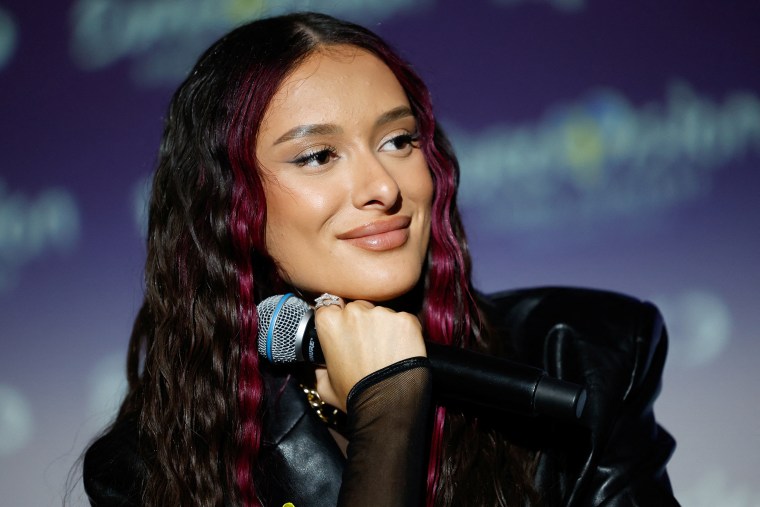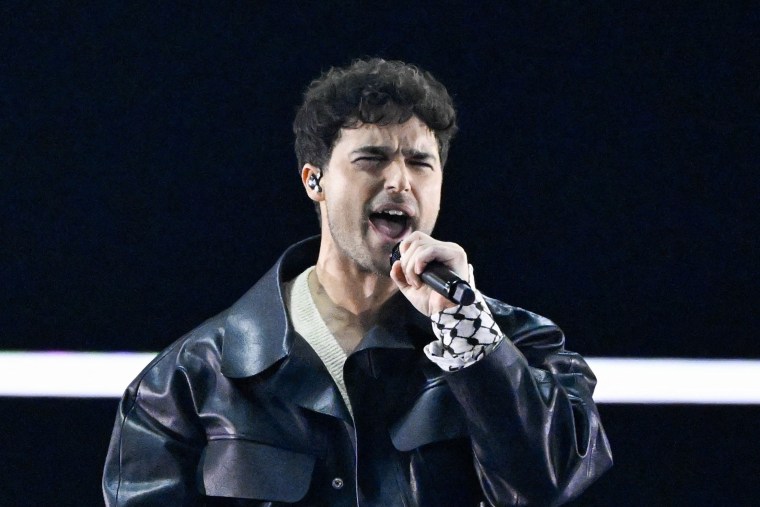Politics gets in the way of pop as Israel’s war in Gaza overshadows Eurovision Song Contest
MALMÖ, Sweden — Behind the music, color and high camp, geopolitics has never been far from the surface at the Eurovision Song Contest, be it through subtly political lyrics, boycotts or the outright ban on Russia after it invaded Ukraine two years ago.
This year’s competition in the Swedish city of Malmö is no different, with Israel’s war in the Gaza Strip at the forefront of the conversation among performers and fans alike.
And as thousands of people flock to the coastal city for the event, large protests have already taken place about Israel’s participation in the competition, and another is expected Thursday, when its representative Eden Golan will take part in the semi-final.
“They are allowed to throw glitter and sing with one hand and throw bombs with another hand,” Pia Jacobsen, an organizer with Swedish campaign group Stop Israel for Peace and a Free Palestine, told NBC News in a phone interview Wednesday.

The decision by the contest’s organizer, the European Broadcasting Union (EBU), to ban Russia after it invaded Ukraine was something she agreed with, she said, adding that she thought it was hypocritical to let Israel compete while it waged war in Gaza.
Security in Malmö is high and officers from neighboring Denmark and Norway have been drafted in to help, Jimmy Modin, a spokesperson for Malmö’s police, said in an interview last week. While they would be prepared for anything, he said they were not expecting the protests to get violent.
Several petitions have also demanded Israel be excluded from the contest it has been taking part in since 1973, although it is not technically in Europe.
The EBU has long strived to keep pop and politics apart — banning overtly political symbols and lyrics — but global tensions have often imposed themselves on the contest and things are no different this year.
At Tuesday’s semifinal, nonbinary Irish contestant Bambie Thug, who uses gender-neutral pronouns, was ordered to remove makeup from their face and legs that featured the words “cease-fire” and “freedom for Palestine” written in a medieval Irish alphabet. The EBU said it contravened rules “designed to protect the non-political nature of the event.”
It also rebuked Eric Saade, a former Swedish Eurovision contestant of Palestinian descent, for wearing a keffiyeh, the black-and-white checkered scarf that is synonymous with Palestinian nationalism, on his wrist during a guest performance.

While they did not demand a ban for Israel, artists from the U.K., Denmark, Finland, Ireland, Lithuania, Norway, Portugal, San Marino and Switzerland signed a joint statement calling for a cease-fire in Gaza, where almost 35,000 people have been killed since the start of the Israel-Hamas war.
“We do not feel comfortable being silent,” the statement said. “It is important to us to stand in solidarity with the oppressed and communicate our heartfelt wish for peace, an immediate and lasting cease-fire, and the safe return of all hostages.”
Swiss singer Nemo, another nonbinary performer who uses gender-neutral pronouns, said in a video call last week that they added their name because they “just felt like I needed to use my voice.” They added that the artists spent a long time working on the wording until “we all felt like we could actually have a positive impact.”
Lithuanian singer Silvester Belt, a fellow signatory, said he didn’t want to ignore “the elephant in the room.”
Another of the letter’s signatories, British entrant Olly Alexander, also faced a call to boycott the competition because of Israel’s participation in an open letter from Queers for Palestine, a group of more than 450 artists, individuals and organizations in his homeland, including several well-known actors and playwrights.
Alexander said in a statement posted to Instagram that he understood the call, but after deliberating and speaking to other contestants, “we’ve decided that by taking part we can use our platform to come together and call for peace.”




